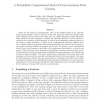Free Online Productivity Tools
i2Speak
i2Symbol
i2OCR
iTex2Img
iWeb2Print
iWeb2Shot
i2Type
iPdf2Split
iPdf2Merge
i2Bopomofo
i2Arabic
i2Style
i2Image
i2PDF
iLatex2Rtf
Sci2ools
COGSCI
2010
2010
A Probabilistic Computational Model of Cross-Situational Word Learning
Words are the essence of communication: they are the building blocks of any language. Learning the meaning of words is thus one of the most important aspects of language acquisition: children must first learn words before they can combine them into complex utterances. Many theories have been developed to explain the impressive efficiency of young children in acquiring the vocabulary of their language, as well as the developmental patterns observed in the course of lexical acquisition. A major source of disagreement among the different theories is whether children are equipped with special mechanisms and biases for word learning, or their general cognitive abilities are adequate for the task. We present a novel computational model of early word learning to shed light on the mechanisms that might be at work in this process. The model learns word meanings as probabilistic associations between words and semantic elements, using an incremental and probabilistic learning mechanism, and draw...
Related Content
| Added | 09 Dec 2010 |
| Updated | 09 Dec 2010 |
| Type | Journal |
| Year | 2010 |
| Where | COGSCI |
| Authors | Afsaneh Fazly, Afra Alishahi, Suzanne Stevenson |
Comments (0)

